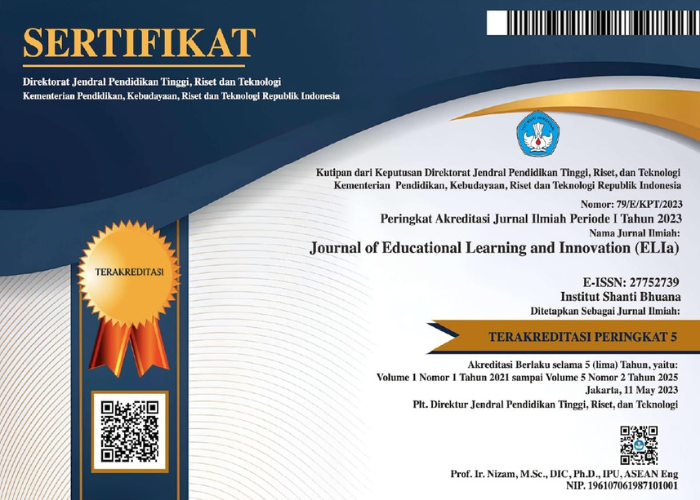HUBUNGAN GRIT DENGAN PRESTASI AKADEMIK MAHASISWA
Abstract
Karakteristik seseorang yang terdiri atas tekad, ketangguhan, dan fokus untuk mencapai target/tujuan akademik disebut grit akademik. Penelitian ini bertujuan untuk mengetahui hubungan antara grit dengan prestasi akademik mahasiswa. Oleh karena itu, penelitian ini menggunakan metode korelasional dengan pendekatan kuantitatif. Sebanyak 77 orang mahasiswa Pendidikan Kimia UIN Syarif Hidayatullah Jakarta yang menjadi sampel ditentukan dengan teknik sampling proportionate stratified random sampling. Instrumen yang digunakan adalah angket (kuesioner) grit dan data dianalisis dengan menggunakan teknik korelasi Pearson Product Moment. Hasil penelitian ini menunjukkan bahwa terdapat hubungan positif yang signifikan antara grit dengan prestasi akademik mahasiswa dengan koefisien korelasi sebesar 0,282 yang termasuk dalam kategori rendah.
References
Abdullah, M. (2015). Metode Penelitian Kuantitatif. Sleman: Aswaja Pressindo.
Abubakar, U., Azli, N. A. S. M., Hashim, I. A., Kamarudin, N. F. A., Latif, N. A. I. A., Badaruddin, A. R. M., Razak, M. Z., & Zaidan, N. A. (2021). Association Between Grit and Academic Achievement Among Undergraduate Pharmacy Students in Malaysia. Currents in Pharmacy Teaching and Learning, 13(5), 550–555. https://doi.org/10.1016/j.cptl.2021.01.013
Adhi Prastistha Silen. (2014). Pengaruh Kecerdasan Intelektual, Kecerdasan Emosional, dan Kecerdasan Spiritual Terhadap Prestasi Akademik. Jurnal Bisnis Dan Ekonomi (JBE), 21(02), 116–133.
Amalia, R. (2022). PERSEPSI MAHASISWA PGSD TERHADAP ANAK BERKEBUTUHAN KHUSUS DALAM KONTEKS SEKOLAH INKLUSI. Journal of Educational Learning and Innovation (ELIa), 2(1), 26-41.
Bazelais, P., Lemay, D. J., & Doleck, T. (2016). How Does Grit Impact College Students’ Academic Achievement in Science? European Journal of Science and Mathematics Education, 4(1), 33–43.
Chairiyati, L. R. (2013). Hubungan Antara Self-Efficacy Akademik dan Konsep Diri Akademik dengan Prestasi Akademik. Humaniora, 04(02), 1125–1133.
Clark, K. N., & Malecki, C. K. (2019). Academic Grit Scale: Psychometric Properties and Associations With Achievement and Life Satisfaction. Journal of School Psychology, 72, 49–66. https://doi.org/10.1016/j.jsp.2018.12.001
Duckworth, A. L., Peterson, C., Matthews, M. D., & Kelly, D. R. (2007). Grit: Perseverance and Passion for Long-Term Goals. Journal of Personality and Social Psychology, 92(6), 1087–1101. https://doi.org/10.1037/0022-3514.92.6.1087
Duckworth, A. L., & Quinn, P. D. (2009). Development and Validation of The Short Grit Scale (Grit-S). Journal of Personality Assessment, 91(2), 166–174. https://doi.org/10.1080/00223890802634290
Fries, S., Schmid, S., & Hofer, M. (2007). On The Relationship Between Value Orientation, Valences, and Academic Achievement. European Journal of Psychology of Education, XXII, 201–216.
Garkaz, M., Banimahd, B., & Esmaeili, H. (2011). Factors Affecting Accounting Students’ Performance: The Case of Students at The Islamic Azad University. Procedia - Social and Behavioral Sciences, 29, 122–128. https://doi.org/10.1016/j.sbspro.2011.11.216
Lam, K. K. L., & Zhou, M. (2019). Examining The Relationship Between Grit and Academic Achievement Within K-12 and Higher Education: A Systematic Review. Psychology in the Schools, 56(10), 1654–1686. https://doi.org/10.1002/pits.22302
Mardelina, E., & Muhson, A. (2017). Mahasiswa Bekerja dan Dampaknya Pada Aktivitas Belajar dan Prestasi Akademik. Jurnal Economia, 13(02), 201–209.
Meriac, J. P. (2015). Examining Relationships Among Work Ethic, Academic Motivation and Performance. Educational Psychology, 35(5), 523–540. https://doi.org/10.1080/01443410.2014.895291
Papilaya, J. O., & Huliselan, N. (2016). Identifikasi Gaya Belajar Mahasiswa. Jurnal Psikologi Undip, 15(1), 56–63.
Purbosari, P., & Sutrisno, T. (2021). Studi Korelasi Intensitas Menonton Youtube Terhadap Minat Belajar Mahasiswa PGSD Universitas Veteran Bangun Nusantara. Journal of Educational Learning and Innovation (ELIa), 1(2), 117-128.
Rista Febianti Wibowo. (2014). Self Efficacy dan Prokrastinasi pada Mahasiswa Fakultas Psikologi Universitas Muhammadiyah Surabaya. Calyptra: Jurnal Ilmiah Mahasiswa Universitas Surabaya, 03(01), 1–11.
Rizkyani, A. M. (2020). Hubungan Antara Self Regulated Learning dengan Prokrastinasi Akademik Pada Mahasiswa Pendidikan Kimia. Skripsi. Fakultas Ilmu Tarbiyah dan Keguruan. UIN Syarif Hidayatullah Jakarta: Jakarta.
Sari, A. A., & Royanto, L. R. M. (2019). Nilai Prestasi sebagai Moderator Hubungan Kegigihan dengan Prestasi Akademik. Jurnal Psikologi Teori Dan Terapan, 9(2), 91. https://doi.org/10.26740/jptt.v9n2.p91-100
Sugiyono. (2009). Metode Penelitian Kuantitatif, Kualitatif, dan R&D. Bandung: Penerbit Alfabeta.
Sukandarrumidi. (2012). Metodologi Penelitian: Petunjuk Praktis Untuk Peneliti Pemula. Yogyakarta: Gadjah Mada University Press.
Zuraida. (2017). Hubungan Prokrastinasi Akademik dengan Prestasi Belajar pada Mahasiswa Fakultas Psikologi Universitas Potensi Utama. Kognisi Jurnal, 02(01), 2528–4495.
Copyright (c) 2023 Brilliant Dwi Izzulhaq, Tonih Feronika, Aini Nadhokhotani Herpi

This work is licensed under a Creative Commons Attribution 4.0 International License.
Journal of Educational Learning and Innovation (ELIa)
Authors who publish with Journal of Educational Learning and Innovation (ELIa) agree to the following terms:
- Authors retain copyright and grant the journal right of first publication with the work simultaneously licensed under a Creative Commons Attribution License that allows others to share the work with an acknowledgement of the work's authorship and initial publication in this journal.
- Authors are able to enter into separate, additional contractual arrangements for the non-exclusive distribution of the journal's published version of the work (e.g., post it to an institutional repository or publish it in a book), with an acknowledgement of its initial publication in this journal.
- Authors are permitted and encouraged to post their work online (e.g., in institutional repositories or on their website) prior to and during the submission process, as it can lead to productive exchanges, as well as earlier and greater citation of published work (See The Effect of Open Access).













